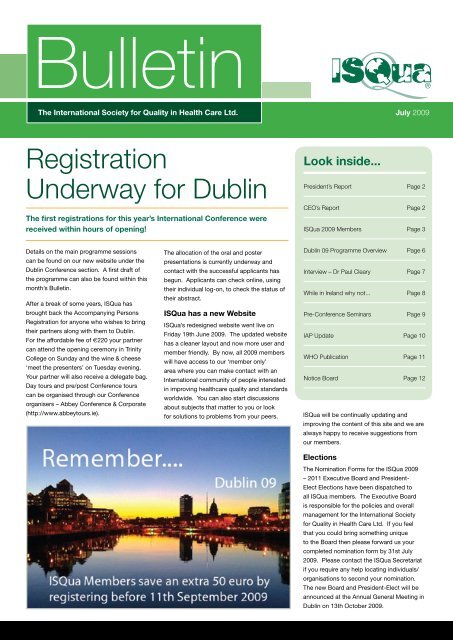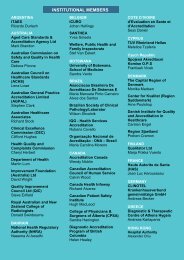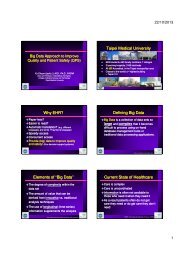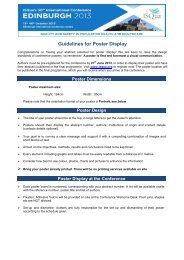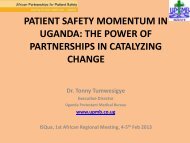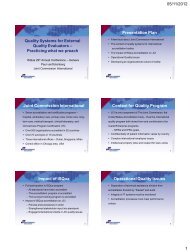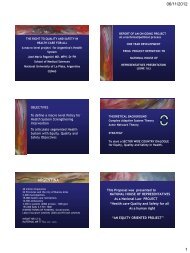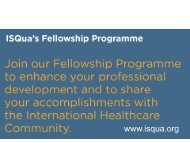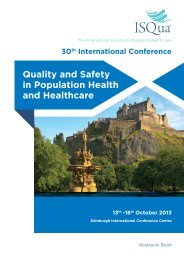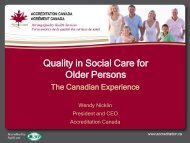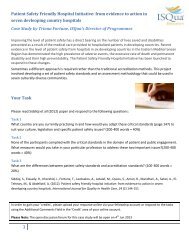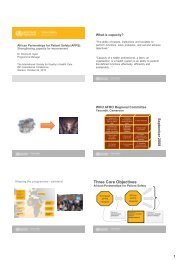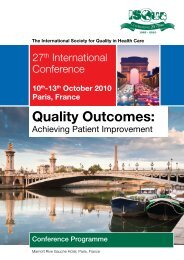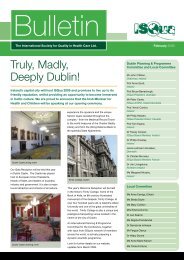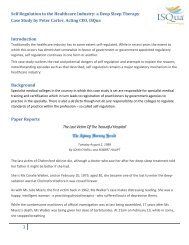July 2009 - ISQua
July 2009 - ISQua
July 2009 - ISQua
- No tags were found...
You also want an ePaper? Increase the reach of your titles
YUMPU automatically turns print PDFs into web optimized ePapers that Google loves.
BulletinThe International Society for Quality in Health Care Ltd. <strong>July</strong> <strong>2009</strong>RegistrationUnderway for DublinThe first registrations for this year’s International Conference werereceived within hours of opening!Look inside...President’s Report Page 2CEO’s Report Page 2<strong>ISQua</strong> <strong>2009</strong> Members Page 3Details on the main programme sessionscan be found on our new website under theDublin Conference section. A first draft ofthe programme can also be found within thismonth’s Bulletin.After a break of some years, <strong>ISQua</strong> hasbrought back the Accompanying PersonsRegistration for anyone who wishes to bringtheir partners along with them to Dublin.For the affordable fee of €220 your partnercan attend the opening ceremony in TrinityCollege on Sunday and the wine & cheese‘meet the presenters’ on Tuesday evening.Your partner will also receive a delegate bag.Day tours and pre/post Conference tourscan be organised through our Conferenceorganisers – Abbey Conference & Corporate(http://www.abbeytours.ie).The allocation of the oral and posterpresentations is currently underway andcontact with the successful applicants hasbegun. Applicants can check online, usingtheir individual log-on, to check the status oftheir abstract.<strong>ISQua</strong> has a new Website<strong>ISQua</strong>’s redesigned website went live onFriday 19th June <strong>2009</strong>. The updated websitehas a cleaner layout and now more user andmember friendly. By now, all <strong>2009</strong> memberswill have access to our ‘member only’area where you can make contact with anInternational community of people interestedin improving healthcare quality and standardsworldwide. You can also start discussionsabout subjects that matter to you or lookfor solutions to problems from your peers.Dublin 09 Programme Overview Page 6Interview – Dr Paul Cleary Page 7While in Ireland why not... Page 8Pre-Conference Seminars Page 9IAP Update Page 10WHO Publication Page 11Notice Board Page 12<strong>ISQua</strong> will be continually updating andimproving the content of this site and we arealways happy to receive suggestions fromour members.ElectionsThe Nomination Forms for the <strong>ISQua</strong> <strong>2009</strong>– 2011 Executive Board and President-Elect Elections have been dispatched toall <strong>ISQua</strong> members. The Executive Boardis responsible for the policies and overallmanagement for the International Societyfor Quality in Health Care Ltd. If you feelthat you could bring something uniqueto the Board then please forward us yourcompleted nomination form by 31st <strong>July</strong><strong>2009</strong>. Please contact the <strong>ISQua</strong> Secretariatif you require any help locating individuals/organisations to second your nomination.The new Board and President-Elect will beannounced at the Annual General Meeting inDublin on 13th October <strong>2009</strong>.
<strong>ISQua</strong> BulletinProf. Bruce Barraclough,<strong>ISQua</strong> PresidentAt the meeting Ms Helen Crisp resigned herposition on the Board and Ms Jan Mackereth-Hill will replace her as the representative ofCHKS for the duration of this term of office.Helen has played a significant role duringher time on the Board and we wish her wellin her new position. Board members stayedat the Burlington Hotel, the venue for ourAnnual Conference in October, and were mostimpressed with this as a venue for an excitingmeeting. We have identified extra rooms thatcan be used which will allow a significantincrease in the number of offered papers andposters to be presented.Some new directions have been includedin our Strategic Plan which your Boardbelieves will both consolidate recent progressand provide a good base for continueddevelopment of the Society, the provision ofvalue to members and the ability to meet ourPresident’sReportThe <strong>ISQua</strong> Executive Board met in Dublinearly in June for the regular June Boardmeeting and the annual strategic retreat.mission of “driving and enabling continuedimprovement in the quality and safety ofhealth care world wide, through education,research, collaboration and the disseminationof evidence based knowledge”.Our strategic goals going forward are to:• Provide global leadership for safety andquality improvement• Increase and improve communication,engagement and influence with allstakeholders• Establish key strategic alliances to supportfulfillment of mission• Establish effective educationalopportunities in safety and quality acrossall regions• Develop and execute an effective businessmodel for all activities• Develop and enable the use of knowledgeand research in quality and safetyFollowing the Strategic Retreat, our CEO, RoisinBoland is developing an action plan to giveeffect to the issues identified by the Board sothat we will have the activities and programmesunderway to deliver on these strategic goals.Given the spread of our membership andthe increased focus on safety and qualityworldwide, new strategic alliances need to bedeveloped for us to leverage our influence bycollaborative effort. Some exciting opportunitiesfor strategic alliances are “on the table”.The nomination and election process forExecutive Board members and the President -elect is underway and results will be announcedin October. The strength of this Society isunderpinned by the caliber of those offeringto serve on our Board which needs inputfrom all regions of the world. To achieve this,it is planned that we will co-opt observersfrom regions not represented through thenomination/election process.Our Annual Conference in October is fastapproaching and there is great value in beingan early bird registrant … so, “see you all inDublin”!Bruce Barraclough<strong>ISQua</strong> PresidentRóisín Boland,CEOI have to also express my particular gratitude tothe Board and staff of <strong>ISQua</strong> for their supportand to Peter Carter and his wife Judy for makingthe time to come to Dublin and taking on thetask of overseeing <strong>ISQua</strong> during my absence. Iam delighted to be back to work.There has been much activity since the lastBulletin, the website went live in the middle ofJune and brings <strong>ISQua</strong> into a new interactiveand dynamic phase and provides the forumfor members to communicative and learn fromeach other. I would like to acknowledge thework Sinead McArdle from this office and EDC,CEO’s ReportFirst of all I would like to say thank you to themany of you who sent good wish messages tome either directly or through the office, theywere of immense support to me and withoutdoubt helped me through my illness.Bangalore did in developing and getting thesite to this stage. All comments and feedbackon the Site would be gratefully received.The record number of abstracts received forour Conference in Dublin in October have allbeen reviewed by the international panel ofreviewers, I am grateful to them for undertakingthis task. Abstracts that have been acceptedfor either a 15 minute oral presentation, 5minute poster presentation or for poster displayhave been identified. All those who submittedabstracts are currently being informed of thestatus of their submission.Pre-Conference Seminars have been a featureof our conference for many years now. Thisyear there are a number of different seminars tochoose from and outlines of two of the seminarsare included in this Bulletin. The other seminarswill be featured in the next Bulletin.Congratulations to the America Associationof Blood Banks, Dubai Health Care City andthe Australian General Practice AccreditationLimited/Quality in Practice on their AccreditationAwards. News from the Accreditation Council’srecent meeting in Malaysia is also presented.As part of <strong>ISQua</strong>’s policy to connect withorganisations with similar missions, the PickerInstitute have provided a very interesting andinformative article for this edition from one oftheir “Conversations with Leaders in the Field ofPatient-Centered Care” series.A list of current members as of 1st June <strong>2009</strong> isincluded, I hope to see you all in Dublin.Róisín BolandCEO2
<strong>ISQua</strong> Bulletin<strong>ISQua</strong> Membership: June <strong>2009</strong><strong>ISQua</strong>’s worldwide links jointogether members in nearly70 countries.In this issue we are publishing a list of all <strong>2009</strong>member names with their countries current atthe beginning of June. Further registrationswill be published later in the year.Privacy restrictions in many countries restrictthe publication of contact details. Anymember needing further details can contact<strong>ISQua</strong>’s secretariat with their request.Life MembersProf.dr Evert ReerinkDr Hannu VuoriDra Rosa SuñolDr John Best AODr William JesseeDr Chris W BrookDr Charles D ShawDr Enrique RuelasDr Ferdinand Siem TjamProf Heather PalmerMrs. Elma HeidemannMs Lee TregloanFoundational MembersAUSTRALIADepartment of Human ServicesDr Chris BrookCANADAAccreditation CanadaMs Wendy NicklinAffilitation MembersAUSTRALIAAustralasian Association for Qualityin Health Care – AAQHCMs Kathleen RyanInstitutional MembersAUSTRALIAAged Care Standards & Accreditation AgencyLtdMr Mark BrandonAustralian Council on HealthcareStandards (ACHS)Mr Brian JohnstonAustralian General Practice Accreditation Ltd /Quality in Practice Pty Ltd - AGPALMs Kylie FaheyAustralian Healthcare AssociatesProf Richard StockClinical Excellence Commission (CEC)Prof Clifford HughesCommunio Pty LtdMr David AroHealth Quality & Complaints CommissionMrs Cheryl HerbertOffice of Safety & Quality in Health Care DrDorothy JonesQuality Improvement Council Ltd. (QIC) MrSteve EinfeldRoyal Australian and New Zealand College ofRadiologistsMr Donald SwinbourneRoyal Australian College of GeneralPractitioners (RACGP)Dr Zena BurgessThe Joanna Briggs InstituteProf Alan PearsonBOSNIA AND HERZEGOVINAAgency for Accreditation and HealthcareQuality Improvement of Republika Srpska -AAQIDr Sinisa StevicBRAZILAssociação Brasileira de Acreditação deSistemas e Serviços de Saúde - CBADr Maria Manuela Pinto Carneiro Alves dosSantosIQG – Health Services AccreditationDr Rubens CovelloCANADACanada Health InfowayMr Richard AlvarezCanadian Institute for Health Information (CIHI)Dr Indra PulcinsCanadian Patient Safety InstituteMr Philip HassenCollege of Physicians & Surgeonsof Alberta (CPSA)Dr Bryan WardCYPRUSMinistry of Health, CyprusDr Andreas PolynikisDENMARKCenter for Kvalitet - Region SyddanmarkMs Arne PoulstrupDanish Institute for Quality and Accreditationin HealthcareMr Karsten HundborgNational Board of HealthMr Morten Andreas HjulsagerNational Institute of Public HealthDr Finn Kamper- JorgensenRegion SjaellandDr Preben CramonThe Capital Region of DenmarkMrs Inge KristensenThe Danish Cancer SocietyDr Janne Lehmann KnudsenThe Danish National Indicator ProjectMrs Krog Birgitte RandrupFRANCEHaute Autorité de Santé (HAS)Dr Laurent DegosGERMANYQMS-International GMBHMr Dirk IjsselstijnGREECEDiagnostic & Therapeutic Centre of Athens“Hygeia” S.AMr Andreas KartapanisHONG KONGDepartment of Health, HKSARG (PDQA)Dr Kon Hung KwokHong Kong Association of GerontologyMs Stella Yuk Ha CheungINDIANational Accreditation Board for Hospitals andHealthcare Providers (NABH)Mr Girdhar J GyaniIRELANDHealth Information and Quality Authority -HIQADr Tracey CooperMental Health CommissionMr Brian O’SullivanSt James’ HospitalIan CarterThe Academy of Medical Laboratory ScienceMr Kevin O’ConnellISRAELMaccabi Health ServicesMrs Magaritz Hagit3
<strong>ISQua</strong> BulletinInstitutional Members continuedITALYCentre for Training & Research in Public Health- CEFPASDr Pina FrazzicaHEALTH CARE NATIONAL SYSTEMEVALUATIONProf Sabina NutiJAPANJapan Council for Quality Health Care - JCQHCM. Tetsuo IharaJORDANHealth Care Accreditation Council (HCAC)Ms May Abu HamdiaIbn Al-Haytham HospitalMiss Ikhlas MatalkaIstiklal HospitalDr Hashem Al-FadelKUALA LUMPURGleneagles HospitalDr Richard NG Kwong FaiKYRGYZSTANMedical Accreditation CommitteeMr Sabyrbek OrosalievLITHUANIAState Health Care Accreditation Agency underthe Ministry of Health of theRepublic of LithuaniaDr Juozas GaldikasMalaysiaAsian Society for Quality in Health Care(ASQua)Dr K. KulaveerasingamMalaysian Society for Quality in Health - MSQHDr Datin Paduka Siti Sa’diah Sheik BakirNIGERIAMediplan Healthcare LtdDr Benebo Victor J.K.Songhai Health Trust Ltd.Dr Basheer MohammedTotal Health TrustDr Oladipupo AwosikaNORWAYNorwegian Knowledge Centrefor the Health ServicesMr Geir BukholmPAKISTANThe Aga Khan University HospitalMr Nadeem M KhanPHILIPPINESPhilippines Council on Accreditation ofHealthcare Organizations (PCAHO)Dr Tomas P Maramba, JrPORTUGALEntidade Reguladora da SaudeDr Eurico Castro AlvesREPUBLIC OF KOREAHealth Insurance Review andAssessment ServiceMr Jai Seong SongKHIDIMrs Kyoung-mi ChoSOUTH AFRICACouncil for Health Services Accreditation ofSouthern Africa (CoHSASA)Prof Stuart WhittakerSPAINFundacion Agencia de Calidad Sanitariade AndalucíaDr Antonio Torres OliveraSWITZERLANDKantonsspital GraubüdenMr Heinrich NeuweilerTAIWAN R.O.CTaiwan Joint Commission on HospitalAccreditation (TJCHA)Dr Bor-Shen HsiehTHAILANDInstitute of Hospital Accreditation ThailandDr Anuwat SupachutikulUNITED ARAB EMIRATESDubai Healthcare CityDr Ayesha Al MutawaUNITED KINGDOMGuys & St Thomas’s NHS Foundation TrustMiss Eileen WalshHealthcare Accreditation & Quality Unit - CHKSMs Helen CrispNHS Quality Improvement, ScotlandMr David SteelPicker Institute EuropeMs Caroline PowellThe Health FoundationDr Vin McLoughlinThe National Autistic Society (NAS)Ms Lydia DanielsUSAAmerican Nurses Credentialing Center& American Nurses AssociationDr Jeanne FloydCompanion Global HealthcareMr David BoucherPicker Institute, Inc.Mrs Lucile HanscomSociety of Chest Pain CentersMs Kay HolmesURACMr Alan SpielmanWEST INDIESMinistry of HealthMr Martin E. CoxIndividual MembersARGENTINADr Hugo E ArceDr Viviana E. RodriguezDr Ezequiel Garcia ElorrioAUSTRALIADr Robert GibberdDr Marjorie PawseyDr Debra GravesProf W B RuncimanMrs. Kerry BradleyProf Likun PeiDr Joseph IbrahimMs Pat J MartinMs Leigh RhodeMrs. Virginia RigoniProf Sandy MiddletonProf Bruce BarracloughMr Greg PullenMrs. Merrin PrictorMs Jane K MillerMs Prudence PowerMs Helen EastwoodDr Mark SmithDr Laurance Andrew WatsonHon Dr Michael ArmitageMrs. Rhonda ColemanDr Sue EvansDr Claire BrownProf Jeffrey BraithwaiteMs Marise Goddard-JonesMr Jonathan D WoodmanDr Allan KerriganProf Chris BaggoleyAUSTRIAProf Christian KoeckDr Manfred FreimüllerDr Albin KrczalBELGIUMProf Arthur VleugelsDr Gauthier DesuterDr Xavier De BethuneDr Geert Van de WaterProf Marc NoppenBRAZILDr Laura M C SchiesariMrs. Anna Margherita Toldi BorkCANADADr Tania DienerMs Patricia McKernanMs Polly StevensDr Dennis KendelMs Anne CoghlanMr Leonard CserhatiMrs. Linda HunterMs Jill PetrellaMs Cathy SzaboMs Karen ArchbellProf Robin McFaddenMr Dwight NelsonMr Philip HassenMs Kris GustavsonDr James RobbleeMr Gerard DesirCYPRUSDr Stelios ChristofidesCZECH REPUBLICDr David Marx4
<strong>ISQua</strong> BulletinDENMARKDr Paul D BartelsMr Peter RhodeMr Finn JensenDr Peder JestDr Lars OberlanderDr Jennifer ZelmerProf Helle ØrdingEGYPTDr Injy Ahmed KhorshidFINLANDDr Ilmo SaxelinFRANCEProf Pierre LombrailDr Alexandra Giraud-RoufastDr Romuald RiemMr Albert BohbotGERMANYProf Dr Ferdinand GerlachProf Hans- Konrad SelbmannDr Jochen BredehoeftDr Berndt BirknerDr Bernhard GibisMs Sylvia SaxDr Eva TezcanGREECEDr Vassiliki PapanikolaouINDONESIADr Upiek Chusniati Fibrianti Budi UtamiIRELANDDr Stiofan de BurcaMs Roisin BolandMr John SweeneyMs Mary ShoreMs Teresa LeeMs Triona FortuneMs Eilis Murphy-CarolanMr Vincent BartonMrs. Annette JollyISRAELDr Tamar Zemach-MaromITALYDr Carlo FavarettiDr Giuliano MariottiMr Pierangelo BoniniProf Massimiliano PanellaProf Plinio Pinna PintorJAMAICADr Una ReidJAPANMr Atsushi KobayashiDr Takeshi MorimotoKUWAITMs Patricia TempleMALAYSIADr Abu Bakar SuleimanMs Zauyah TarmizziMEXICODr Carlos Varela - RuedaMr Manuel Ramirez SandezNETHERLANDSDr Elisabeth W BoeschotenDr Ralph K.L SoNIGERIADr Oladipupo AwosikaDr Kalada RichardDr Benebo Victor J.K.Mr Daprim Samuel OgajiDr Anthonia AdinduDr Amara A AlbertDr Henry OgunsanyaPERUDr Jose L Piscoya - ArbañilPORTUGALDr Rui FreitasSAUDI ARABIADr Tawfik A M KhojaDr Ghazi M Al QatariMs Eibhlin M Ni LaoghaireMrs. Sharon MyersDr Dina BaroudiDr Nlabi El ZamzamySINGAPOREMs NellieYeoSOUTH KOREAProf Sang- Il LeeDr Hyun Soo ChungProf Chang Hyun SookSPAINDr Fernando Ramos D'AngeloProf Pedro J SaturnoProf Jose Joaquin MiraSWEDENDr Mikael RahmqvistDr Jörgen StriemDr Else RibbeSWITZERLANDDr F BarazzoniDr Norbert RoseDr Jean- Blaise WasserfallenMr Christian HayProf Sabina de GeestDr Hans U RothenTAIWANMrs. Doresses LiuDr Ching-Ming LiuDr Shu-Chuan ChangTRINIDAD & TOBAGOMs Valerie Alleyne RawlinsUNITED KINGDOMMs Beverley Mc Dowall-RoseDr Carlos Hiran Goes de SouzaDr Dave HaranProf Kieran WalsheMs Nancy DixonMr Stephen McAndrewDr Sir John OldhamDr Amir HassanMr James StevenUSADr Louis DiamondProf Sheila Leatherman, CBEDr Sheryl CoughlinDr James R HeibyDr Michael A CounteDr Paul van OstenbergDr Jerod M LoebDr Don NielsenDr David BallardDr John F HelfrickMs Margaret Van AmringeMs Karen H. TimmonsDr Kenneth W KizerDr Steven J MeurerProf Deborah W GarnickMr James NaessensDr Margarita P HurtadoDr Yosef D. DlugaczProf Vivian CoatesProf Patrick S RomanoDr David W BatesDr Diana SilimperiDr Bruce D AginsDr Linda AikenMr Christopher CornueMs Kathy AppleMs Maureen PotterMr Edward P ChappyProf Eric C SchneiderDr Peter AngoodDr William PowellMr Eric QuackenbushDr Thomas P. MeehanMs Melanie SwanDr Jennifer HaasMs Catherine BesthoffDr Vikas DesaiMs Annette WatsonMr Eric Gwochau LiaoDr Anbrasi EdwardInternational Journal forQuality in Health CareDid you Know…?<strong>ISQua</strong> members receivethe International Journal forQuality in Health Care aspart of their membershipbenefits and can also gainfree online access to thepublication.To read the journalonline, you must haveyour current subscribernumber.To get your subscriber number, either:1. Contact <strong>ISQua</strong> at: isqua@isqua.org2. Locate the subscriber number which is printedon the mailer sheet for the journalWhy Access Content Online?Advance Access – Read articles online weeks aheadof print publication, without having to wait for the printedition to land on your doorstep.Simply visit: www.oxfordjournals.org/page/3584/1High Quality Content – Select the 50 most highlycited articles to read online.Simply visit: www.oxfordjournals.org/page/3584/2We hope you enjoy your FREE online access tothe journal.5
<strong>ISQua</strong> BulletinProgramme Overview Dublin <strong>2009</strong>SUNDAY 11 OCTOBER09:00 - 17:00 <strong>ISQua</strong> Pre-Conference ProgrammeChoice of 3 concurrent sessions:• Quality and Safety Trends 1• Quality and Safety Trends 2• Accreditation Symposium• Indicators Summit19:00 Welcome Reception at the Dining Hall,Trinity CollegeMONDAY 12 OCTOBER <strong>2009</strong>07:30 – 08:45 Globalization Breakfast MeetingProf Sheila Leatherman09:00 – 09:1009:10 - 09:1509:15 – 09:2509:25 – 10:25Conference Opening: Minister for Healthand ChildrenConference Welcome : Prof. Barraclough,President of <strong>ISQua</strong> & Mr. John O’Brien,Executive Chair for ConferenceMaking the Most of the ConferenceOpening Plenary Session - ‘HospitalDesign and the Control of Infections:Bad Design Leads to Bad Outcomes’and ‘Evidence-based Hospital Design forSafety’Dr. Michael Gardam and Prof.Roger S. Ulrich10:25 –10:30 Lifetime Membership Award10:30 – 11:00 Morning Break11:00 – 12:30 Concurrent Sessions12:30 – 14:00 Lunch13:15 – 13:50 Poster Presentation Sessions14:00 – 15:30 Concurrent Sessions15:30 – 15:45 Afternoon Break15:45 – 16:4516:45 – 17:00 Picker AwardsPicker Debate/Hypothetical - ‘On theCouch’Ms Aine Lawlor; Prof. Clifford Hughes; MsLinda Kenny and Prof. Rick Van Pelt19:00 Gala Reception, Dublin CastleTUESDAY 13 OCTOBER <strong>2009</strong>08:45 – 09:0009:00–10:30Distinguished Service Award & ReizensteinAwardMorning Plenary – ‘Improving Care Qualitythrough Electronic Health Records: TheExperience at Partners Health Care’ and‘Pursuing the Mandates to Accelerate theDevelopment of Electronic Health RecordSystems across the Country, Progress andGoals: The Experience of Canada HealthInfoway’Dr. John Glaser and Mr. Richard Alvarez10:30– 10:45 Address by the President of Ireland10:45 – 11:15 Morning Break11:15 – 12:45 Concurrent Sessions12:45 – 14:00 Lunch13:20 – 13:50 Poster Presentation Sessions14:00 – 15:30 Concurrent Sessions15:30 – 15:50 Afternoon Break15:50 – 16:00 Accreditation Certificate Awards16:00 – 17:00 Afternoon Debate/Hypothetical – ‘MarketBased Control: Mechanisms for PatientSafety’.Prof. Enrico Coiera and Prof. Jeffrey Braithwaite17:15–18:00 <strong>ISQua</strong> AGM18:00Poster Presenters Wine & CheeseReception18:30 Professional VisitsWEDNESDAY 14 OCTOBER <strong>2009</strong>09:00 – 10:20 Morning Plenary – ‘Designing PatientSafety Protocols & WHO Safe Surgery,Saves Lives for Developed and DevelopingCountries’.Dr. Abdel-Hadi Suleiman Aj Breizat; Prof. AlanMerry and Prof. Bryce Taylor10:20 – 10:30 Distinguished Service Award10:30 – 10:40 Welcome to Paris10:40 – 11:05 Morning Break11:05 – 12:35 Concurrent Sessions12:35 – 13:45 Lunch13:15 – 13:45 Poster Presentation Sessions13:45 – 14:45 Concurrent Sessions14:45 – 15:00 Poster Presentation Sessions15:00 – 16:30 Afternoon Debate/Hypothetical –‘Evidence is not Enough’.Sir Dr. John Oldham and Mr Phil Higton16:25 – 16:30 Presidents Farewell – Phil Hassen16:30 Conference CloseTHURSDAY 15 OCTOBER <strong>2009</strong>09:00 – 17:00 Mentorship ProgrammeFRIDAY 16 OCTOBER <strong>2009</strong>09:00 – 17:00 Mentorship Programme6
<strong>ISQua</strong> BulletinConversations withLeaders in the Field ofPatient-Centered CareOne of the ways the Picker Institute supports patient-centered careis by recognizing people in health care who have made significantcontributions to achieving patient-centered care worldwide.Paul D. Cleary, Ph.D., is the Dean of the Yale University School of Public Health, where he is theAnna M.R. Lauder Professor of Public Health. His research includes developing better methodsfor eliciting and using patients’ reports about their care and health status to assess and improvethe quality of their care. He also conducts research on the relationships between clinician andorganizational characteristics and the quality of medical care.Dr. Paul ClearyHow important is patient-centerednessto the quality of healthcare?I’ve always been interested in the qualityof health care, and the more research Idid, the more convinced I became thatthe importance of interactions betweenpatients and doctors is underestimated,and those aspects of care understudied.The early Picker surveys of caregivers andpatients demonstrated that interpersonalinteractions and the way providersaddressed patient needs were criticalelements of quality health care.I also quickly learned that as importantas patient-centered care was, it wasabsolutely necessary to have methodicallysound information to motivate providersto change the way they provided care.Unless the information was as reliable andvalid as the other types of information thatadministrators, physicians and nursesused to make decisions, they would notpay attention to it.Do you think patient-centered care hasbeen absorbed into the mainstream ofhealth care thinking?I do. At first, a lot of people were veryskeptical about the concept, but now it israre to talk to professionals who do notthink patient-centered care is important.It’s hard to find anyone in health care whodoes not think that patient-centered carehas a positive influence on outcomes.Thanks to Harvey’s prescience, almosteveryone is on the same page.Why is it worth listening to the patient?We need information from patients that isrigorous and valid and that can be usedto focus efforts on transforming healthcare systems from top to bottom. I, and alot of other people, are working toward afundamental change in the delivery ofhealth care.“Top to bottom” is sweeping. Can yougive an example of what you mean byit?I can. My mother died of cancer someyears ago, and my sister and I had beeninvolved in her care. When she and Iand our father were at the hospital oneday, my mother’s physician took myfather into the hallway to talk. With thenoise typical in a hospital hallway andpeople rushing by, the physician quicklyinformed my father that my mother wasclose to death. My father was, of course,devastated, and my sister and I couldnot believe the way my father had beengiven the most important information hehad ever received. When we were leavingthe hospital parking lot, the attendantwho collected the parking fee was rudeand unfriendly. My father did not sayanything for a long while. Eventually hesaid, “You know, when I was just startingout in business, I used to judge how abusiness was run and the quality of theCEO by the way the receptionist treatedme.” We did not talk much that trip, buteventually I came to understand that hewas reflecting on how poorly the hospital,from the treating physician to the parkinglot attendant, from “top to bottom,” hadtreated him, and that the two were relatedto the culture of the organization.A patient’s needs and preferences shouldbe part of the DNA of an organization, andtop to bottom means just that: integratingpatient-centered care into every job fromthe CEO to the receptionist to the parkingattendant, so that the institution’s qualityof health care can be judged at any level.Many young doctors take olderdoctors—who may not haveincorporated patient-centerednessinto the way they practice—as rolemodels. How long do you think it willtake for the doctors for whom patientcenterednessis basic to qualityhealthcare become the role models?At least a generation, and we’ll need towork long and hard to bring this about,because we are talking about makingfundamental changes to the system.The “good old days” are overrated.Take medical errors, for example. Insurveys about the extent to which they7
<strong>ISQua</strong> BulletinConversations with Leaders inthe Field of Patient-CenteredCare continued.believe medical errors should berecognized and handled, manymedical students say that whatsenior physicians do in responseto errors is a major factor in theirthinking on the subject. If they donot acknowledge errors, medicalstudents are more likely to thinkthat it is OK not to address errors.Similarly, if senior physicians donot respond to patients’ needs andconcerns, medical students willthink that is the appropriate wayto behave. This kind of hiddencurriculum where patient-centeredcare is not a top priority must beeliminated by educating medicalprofessionals to the importanceof patient-centered care at everylevel.While in Ireland why not....Relax with around of golf...Or try your hand at catching awild brown trout or Irish salmon?How can you motivatecaregivers and healthcareinstitutions to understand theimportance of patient-centeredcare and make it a part of theirway of doing things?Many people will disagree with me,but I don’t believe that financialincentives, such as “pay forperformance,” are the answer totransforming the system. If youneed incentives to drive change,then you’re not getting the kinds ofchanges you want.I believe that most peopleare motivated by pride andprofessional ethics, by their desireto do the best possible job theycan. In terms of quality of care,I don’t think treating a patientwith respect is motivated bymoney. We need to help providersunderstand how patients areexperiencing their care and givethem the tools to improve the carethey provide. That is exactly whatHarvey wanted us to do, and whatthe Picker Institute is continuing todo so well.This article was kindly providedfor publication by one of ourInstitutional Members – The PickerInstitute.Or just memories that willlast a lifetime.Why not bring a piece ofIreland home with you...Photos courtesy of Fáilte Ireland.8
<strong>ISQua</strong> BulletinPre-Conference SeminarsStarting in this issue and continuing up until the Conference, we will be giving you a peek at what will bediscussed and debated during the Pre-Conference Seminars, which will be held on Sunday 11th October <strong>2009</strong>.This month we are looking at Simulations, Inflatable Operating Rooms and Leadership....Designing Simulation Strategiesfor Patient Safety - Innovation toImplementationAggarwal R, Kneebone R, Taylor D, Ziv AThe aim of an educational program is to develop individualswho have the knowledge, skills and attitudes required to meetthe healthcare needs of society. Current modes of acquiringhealthcare competencies primarily focus upon experientiallearning in a clinical environment.Innovative technologies in the field of simulation-based trainingand assessment have the potential to radically change thecurrent practices. For example, stand-alone task trainers can beused to traverse the early part of the learning curve in terms oftechnical skills, e.g. for laparoscopic surgery.In Israel, an entire simulation centre has been built which enablesall healthcare workers to experience scenarios ranging fromprimary care clinics, through to mass trauma. These prepareindividuals, and teams for common and untoward events whichmay occur in their daily practice. The centre also uses simulatedenvironments such as an operating theatre, delivery suite orintensive care unit. Though expensive, recent developmentshave investigated the use of the inflatable operating room whichcan be erected within minutes and used in any environment. Thisoffers a suspension of disbelief which is closely approximatedto the clinical setting, at a fraction of the price. Technical,communication, leadership and decision-making skills can betrained, and assessed, in such environments.Further dissemination of simulated healthcare environmentsis possible through the World Wide Web. In virtual worlds, acomputer-based simulated environment is presented, in which‘consumers’ or avatars are able to interact with each otherand their surroundings. The user is presented with perceptualstimuli enabling manipulation of the modelled world leading toan experience of tele-presence. At Imperial College, a virtualhospital has been developed within Second Life. An individualcan wander around the virtual hospital, interact with hospitalequipment (e.g. cardiac monitor, hospital bed) and conversewith other avatars who may be present, in real time. There area staggering number of potential applications, and to datehas been utilized for prototype medical device development,an operating room induction module and a virtual surgicalconference.The exponential rate of development of simulation strategiesshall surely have an impact upon patient safety. The key isto ensure appropriate and timely implementation in order toimprove the delivery of healthcare, worldwide.The Leadership Helm: Building aLeadership Culture to GuaranteeSustainable ExcellenceWagner, MDespite widespread and growing concern about quality, themajority of healthcare organisations around the world haveactually been unable to achieve and maintain significantimprovements in patient safety, resource stewardship, servicequality, or clinical efficacy. In fact, numerous studies demonstratethat even those organisations that have made modestimprovements in their performance are unable to sustain thosegains over time.This vexing problem in healthcare – organisations pressured yetunable to improve – has been the focus of a nine-year researchagenda by The Advisory Board Academies. The core conclusionof that research is that meaningful performance improvementis impossible without significant cultural reform within anorganisation. Unfortunately, too many people believe thatstrengthening culture and leadership is either a matter of gettingthe right people on board or the simple task of setting aggressiveperformance targets. Neither is sufficient, and true reform is farmore difficult and complex than most believe it to be.This conference session will highlight the difference betweensimply developing great leaders – individuals with the talentand ability to be successful – versus creating an entire cultureof transformational leadership – an organisation where successand excellence are not only constantly increasing, but areself-sustaining. The session will define and profile six discreteelements of a transformational leadership culture that are alwaysrequired for success. Those leadership elements include Skills,Character, Values, Knowledge, Opportunity, and Motivation.Participants will learn that each element is vital, that no elementcan compensate for the absence of another, that none ofthese elements is a factor of genetics or luck, and that buildingthis structure is actually quite difficult - requiring senior levelcommitment, constant vigilance, and bold initiative.Participants will also be given a concrete and specific blueprintfor how to engage in just such a bold initiative. The blueprintconsists of 12 organisational tactics – six basic, and six advanced– that are required to embed these elements within a culture.In addition to core learning and supporting materials for thissession, participants will also be invited to participate and use aLeadership Culture Survey that will help to diagnose the strengths(and weaknesses) of their own leadership culture as compared toother organisations represented and participating in this work at<strong>ISQua</strong> <strong>2009</strong>.9
<strong>ISQua</strong> BulletinThe International Accreditation ProgrammeSince our last update in May, the International Accreditation Programme (IAP) has had further cause tocelebrate. We have accredited one set of Standards, a Surveyor Training Programme and an Organisation.Congratulationsto the America Association of Blood Banks (AABB)The AABB Surveyor Training Programme has been accreditedby <strong>ISQua</strong> from June <strong>2009</strong> to May 2013.Congratulationsto the Center for Healthcare Planning & Quality,Dubai Health Care CityThe Outpatient Clinic Standards has been accredited by <strong>ISQua</strong> fromJune <strong>2009</strong> to May 2013.Congratulationsto the Australian General Practice Accreditation Limited /Quality in Practice (AGPAL/QIP)AGPAL/QIP has been accredited by <strong>ISQua</strong> from June <strong>2009</strong>to May 2013.Mid-year Accreditation Council MeetingThe Accreditation Council met in Kuala Lumpur, Malaysia in June forthe regular mid-year meeting. Thanks to Dr Kadar Marikar for hostingthis meeting. This meeting saw representatives from Australia, Jordan,The Netherlands, France, United States, India and Malaysia review theInternational Accreditation Programmes (IAP) current activity and plan futuredirections. 2008 saw a significant increase in the demand on <strong>ISQua</strong> toaccredit both organisations and standards. The trend in <strong>2009</strong> suggests thatthe recently revised surveyor training programme will be the most popularprogramme. In order to address this increased activity the surveyor pool hasincreased by 34%.Ms. Helen Crisp has resigned as a member and Vice-Chair of theAccreditation Council. We would like to wish Helen the very best of luck inher new position in The Health Foundation and thank her for all the supportover a number of years to both <strong>ISQua</strong> and the IAP. We welcome Ms. JanMackereth-Hill as the CHKS member replacing Helen and congratulate Dr. BKRana on his position as Vice Chair to the Accreditation Council.While in Kuala Lumpur, Council members took part in a very successfulconference hosted by the Malaysian Society for Quality in Health “GlobalTrends in Accreditation of Healthcare Facilities and Services”.Front (Left to Right) Triona Fortune, BK Rana, Brian Johnston,Helene Beaard, Kadar MarikarBack (Left to Right) May Abu Hamdia, Charles Bruneau,Paul van Ostenberg, Steven Clark, Mark Brandon10
<strong>ISQua</strong> Bulletin11
<strong>ISQua</strong> BulletinBulletin NoticeboardDates to Remember!21st – 23rd <strong>July</strong> <strong>2009</strong>Applying best Practices in Healthcare DeliveryInternational Healthcare Conference & Exhibition <strong>2009</strong>Joint conference by APHM & ASQua and support by <strong>ISQua</strong>& MSQHLocation: Kuala Lumpur Convention Centre, MalaysiaFor further information: : www.aphmconferences.org/4_exh.htm11th -14th October <strong>2009</strong>International Society for Quality in Health Care,26th International Conference‘A unique conference involving people from across theworld who are committed to delivering safe, high qualityhealth care’Location: The Burlington Hotel, Dublin, IrelandFor Further information: email isqua@isqua.org6th – 9th September <strong>2009</strong>7th Australasian Conference on Safety and Quality inHealth CareThe Australasian Association for Quality in Health Care(AAQHC)Location: Sydney Convention and Exhibition Centre,Darling Harbour, AustraliaFor further information: AAQHC <strong>2009</strong> ConferenceManagers, GPO Box 128, Sydney NSW 2001 AUSTRALIAP: + 61 2 9265 0700 l F: + 61 2 9267 5443 E: aaqch<strong>2009</strong>@tourhosts.com.au24th – 27th October <strong>2009</strong>American Association of Blood Banks Annual Meeting& TXPO <strong>2009</strong>AABB’s Annual Meeting & TXPO is the preeminentmeeting for professionals in the blood banking and cellulartherapies industry.Location: Ernest N. Morial Convention Center, NewOrleans, LA, USAFor further information: Visit www.aabb.org > Meetingsand Events > Annual Meeting & TXPO. Or contactmeeting@aabb.org for more information.18th – 19th September <strong>2009</strong>Hinds Hospice and UCSF Fresno 2nd AnnualInternational Conference‘Hospice and Palliative Care in Developing Countries’Location: UCSF Fresno Center for Medical Education andResearch, 155 North Fresno Street, Fresno, California,93701 USAFor further information: www.cme.ucsf.eduor email jill@hindshospice.org18th – 20th November <strong>2009</strong>American Association of Blood BanksAnnual Meeting & TXPO <strong>2009</strong><strong>2009</strong> JBI International Convention – ‘Ripples to Revolution:from bench to bedside.’Location: Hyatt Regency Hotel, Adelaide, South AustraliaFor further information: Chris Cafcakis, +61 8 8303 3637or chris.cafcakis@adelaide.edu.auInternational Society for Quality in Health Care2 Parnell Square EastDublin 1Ireland.Ph: +353 18717049Fax: +353 1 8783845Web: www.isqua.orgThe <strong>ISQua</strong> Bulletin is published and distributed tomembers six times a year.News and information items are very welcome andshould be sent to the Editor, Ms Róisín Boland, CEO.Disclaimer: Neither <strong>ISQua</strong>, its officers or Board Members will be heldresponsible for news or advertising published in good faith on behalf ofother organisations, and opinions expressed in such items may not beinterpreted as directly reflecting <strong>ISQua</strong> opinion.


